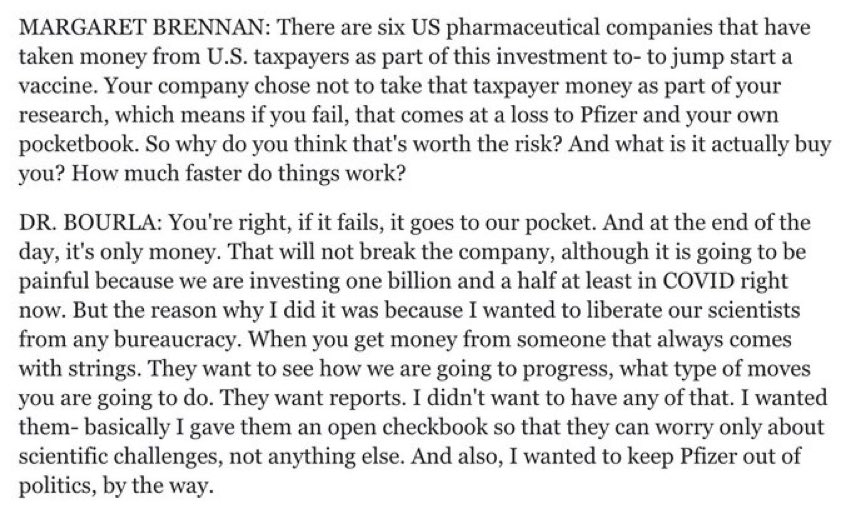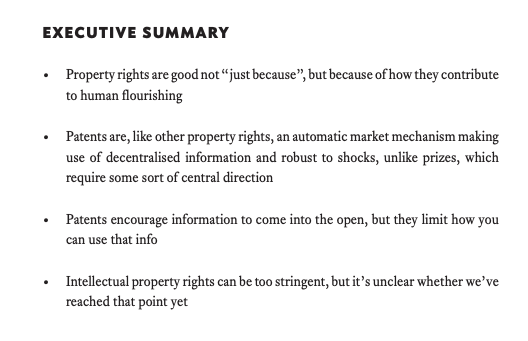The benefits to society of the Pfizer vaccine are likely to be orders of magnitude greater than the profits Pfizer makes from it.
An example of how private innovators only capture a tiny amount of the value they create – only 2.2% by one estimate. https://www.theguardian.com/business/2020/nov/10/pfizer-and-biontech-could-make-13bn-from-coronavirus-vaccine?CMP=Share_iOSApp_Other
An example of how private innovators only capture a tiny amount of the value they create – only 2.2% by one estimate. https://www.theguardian.com/business/2020/nov/10/pfizer-and-biontech-could-make-13bn-from-coronavirus-vaccine?CMP=Share_iOSApp_Other
William Nordhaus, 2018's Econ Nobel Prize winner, estimated that innovators only capture 2.2% of the total social value they create ( https://www.nber.org/system/files/working_papers/w10433/w10433.pdf).
This implies that we should want innovators to make much more profit, to get more innovation. https://pricetheory.substack.com/p/monopolies-dont-make-enough-money
This implies that we should want innovators to make much more profit, to get more innovation. https://pricetheory.substack.com/p/monopolies-dont-make-enough-money
One solution is to subsidize innovation. But it's hard to do that well – subsidies involve bureaucracy and encourage rent-seeking by firms, wasting resources on grant applications, etc. Pfizer itself rejected direct subsidies because of this (but accepted purchase guarantees).
The problem with direct subsidies is that it's difficult to anticipate what research will be valuable and what won't be.
OTOH, intellectual property rules have the advantage of acting *like* a subsidy, while following what the market considers valuable. https://static1.squarespace.com/static/56eddde762cd9413e151ac92/t/5c38ac9688251bcedbb2cc25/1547218095431/Patently+Good+%E2%80%94+Ben+Southwood.pdf
OTOH, intellectual property rules have the advantage of acting *like* a subsidy, while following what the market considers valuable. https://static1.squarespace.com/static/56eddde762cd9413e151ac92/t/5c38ac9688251bcedbb2cc25/1547218095431/Patently+Good+%E2%80%94+Ben+Southwood.pdf
Boringly, I think both direct subsidies and patents are useful, esp if you can do the subsidies in a way that supports innovation that is inherently difficult to patent and you can reduce the deadweight losses involved.
But there are two bad ideas we should dismiss.
But there are two bad ideas we should dismiss.
One, the Mazzucato idea that taxpayers should "get a stake" in innovation that they subsidise.
The point of subsidizing innovation is that taxpayers already get most of the benefits, and only a small amount goes to the innovator. "Taking a stake" undoes the value of the subsidy.
The point of subsidizing innovation is that taxpayers already get most of the benefits, and only a small amount goes to the innovator. "Taking a stake" undoes the value of the subsidy.
Two, the idea that it's bad for Pfizer etc to have a patent over the vaccine because it could charge "too much" for it.
On the contrary: since we want Pfizer to throw money at the next pandemic too, the biggest danger is that Pfizer charges *too little*! https://www.oxfamamerica.org/explore/stories/whats-a-peoples-vaccine-and-how-can-we-get-one/
On the contrary: since we want Pfizer to throw money at the next pandemic too, the biggest danger is that Pfizer charges *too little*! https://www.oxfamamerica.org/explore/stories/whats-a-peoples-vaccine-and-how-can-we-get-one/
My main "policy recommendations" would be to try to reduce the transaction costs of patents – eg make it easy for people to see who owns what IP rules – and to try making subsidizes for innovation as untied as possible (easier said than done!) to minimise deadweight losses.
It's naff to talk about "the DARPA model" but what's intriguing about it is how little process there seems to be and how much it is based on the networks and personal judgement of the programme managers. Contrast with the endless reporting & form filling that InnovateUK requires.
But I don't think that's replicable without the shield of the US DoD – imagine how quickly a UK "Royal DARPA" would fail as soon as it hit the media that it had wasted £x billion on some mad scheme that failed at every turn. There may be an effectiveness-accountability tradeoff!
Here's a nice way of describing a complementarity that may exist between directly funded research and indirectly funded. https://twitter.com/owenbarder/status/1326474613270994945

 Read on Twitter
Read on Twitter



